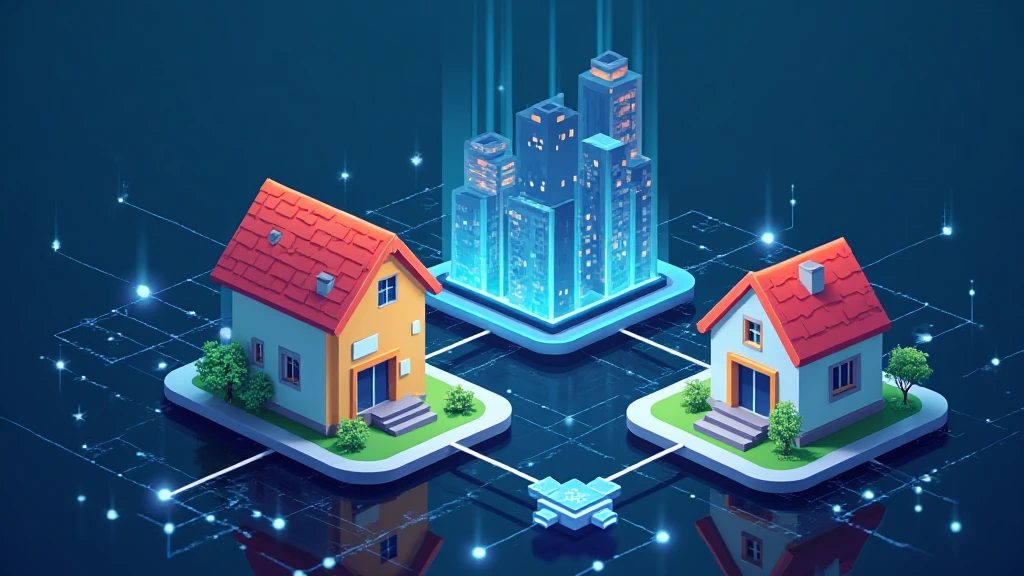Introduction
With the rapid advancement of blockchain technology, the real estate sector is undergoing a monumental shift. According to recent market studies, over $7 trillion of real estate was transacted globally in 2023 alone. However, issues such as fraud, lack of transparency, and high transaction costs remain prevalent. The emergence of decentralized real estate exchanges is set to address these challenges, democratizing access to property transactions and enabling smoother processes.
What Are Decentralized Real Estate Exchanges?
Decentralized real estate exchanges leverage blockchain technology to facilitate property transactions without intermediaries. By utilizing smart contracts, these platforms ensure secure, transparent dealings that benefit buyers and sellers alike. For instance, imagine a property listing where potential buyers can verify ownership, transaction history, and legal compliance, all on a secure blockchain ledger. This system minimizes the risk of fraud and ensures a smoother transaction process.
Benefits of Decentralized Real Estate Exchanges
- Transparency: All transactions are recorded on a public ledger, allowing for greater visibility.
- Cost-Effectiveness: Eliminating intermediaries reduces fees associated with property transactions.
- Global Access: Investors from different regions can participate in real estate markets without geographical restrictions.
- Smart Contracts: Automated processes reduce the time and effort involved in transactions, targeting efficiency.
Market Dynamics: The Rise of Decentralized Real Estate Platforms
The global trend towards decentralization aligns with the increasing demand for transparency in real estate transactions. According to blockchain research firm Chainalysis, the market for decentralized exchanges is expected to reach $1.5 billion by 2025, especially in emerging markets like Vietnam, which has seen a surge in cryptocurrency adoption.

Vietnam: A Case Study
Vietnam’s growing economy and technological adoption have positioned it as a hub for decentralized finance (DeFi). With a user growth rate of over 50% among crypto users in the last year, Vietnamese investors are increasingly engaging with decentralized real estate exchanges, attracted by lower transaction fees and enhanced security. This growth is indicative of a larger trend where traditional markets are integrating blockchain technology.
How Do Decentralized Real Estate Exchanges Work?
Decentralized real estate exchanges operate through blockchain networks, allowing users to create and manage property listings directly. Here’s a simplified breakdown of the process:
- Listing Creation: Property owners can list their properties on the platform.
- Smart Contract Deployment: Smart contracts are created to outline the terms of the transaction.
- Verification: Interested buyers verify the legitimacy of the property through blockchain records.
- Transaction Completion: Once both parties agree, the transaction is executed automatically via the smart contract.
Security Standards in Decentralized Real Estate Exchanges
As with any digital transaction, security is a paramount concern. Blockchain security standards are crucial for protecting user data and assets. For example, implementing a high standard of encryption ensures that sensitive information is safeguarded against potential threats.
Blockchain Security Standards (tiêu chuẩn an ninh blockchain)
Here are a few 2025 security practices that decentralized real estate exchanges should adopt:
- Multi-signature Wallets: Require multiple parties to approve transactions, preventing unauthorized access.
- Regular Audits: Conduct audits to ensure compliance with security standards.
- Real-time Monitoring: Implement systems for ongoing monitoring of transactions to detect anomalies.
Challenges Facing Decentralized Real Estate Exchanges
Despite the numerous advantages, decentralized real estate exchanges are not without their challenges:
- Regulatory Uncertainty: The legal status of such platforms varies by jurisdiction, which can complicate transactions.
- User Education: Many potential users may lack understanding of how to navigate these platforms.
- Market Adoption: Traditional real estate markets may be slow to adapt to disruptive technology.
Conclusion
The future of real estate transactions is undoubtedly leaning towards decentralization. Platforms offering decentralized real estate exchanges present a unique opportunity to revolutionize how properties are bought and sold. As regulatory frameworks evolve and user adoption increases, we can expect to see robust growth in this space.
At cryptobestnews, we are committed to providing you with insights and updates on the latest trends in the crypto and blockchain industry. Stay informed, stay engaged, and explore the endless possibilities that decentralized real estate exchanges bring to the market!


